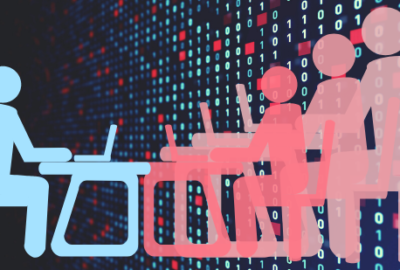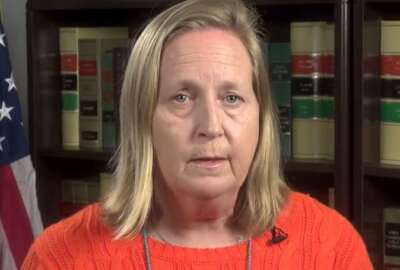A look inside a new DOJ laboratory for law enforcement
The Justice Department's new National Law Enforcement Knowledge Lab is aimed at public safety and what the agency calls constitutional policing.
Best listening experience is on Chrome, Firefox or Safari. Subscribe to Federal Drive’s daily audio interviews on Apple Podcasts or PodcastOne.
The Justice Department houses several labs related to crime and forensics. Now it has a new lab called the National Law Enforcement Knowledge Lab. It’s aimed at public safety and what DOJ calls constitutional policing. For details, Tom Temin spoke with Justice’s Principal Deputy Director for the Bureau of Justice Assistance, Kristen Mahoney.
Interview transcript:
Kristen Mahoney: Something that we identified as kind of a gap in service that we were offering to law enforcement and the communities that they serve. That is, we have a great history of civil rights pattern or practice investigations and enforcement at the Department of Justice. That’s not my department. My division is the Office of Justice Programs, the Bureau of Justice Assistance. We provide training and technical assistance, grants and opportunities for local law enforcement to improve their capacity to reduce crime, reduce victimization. And it occurred to us that in our discussions with our colleagues at the Civil Rights Division, that there’s a real opportunity for us to take knowledge that they have from years of pattern and practice investigation, and turn it into actionable, proactive checklists, documents, translations of “here’s what happened” in those patterns and practice cases. And here’s how we can turn that into knowledge for law enforcement, a new chief, someone’s studying for their lieutenants exam, and understand what those core concepts of constitutional policing are.
Tom Temin: And the Office of Civil Rights Division, that’s where the knowledge originates. Give us an example of the type of case that might be instructive to law enforcement agencies or officers that have not been involved in the civil rights issue with the Justice Department.
Kristen Mahoney: Yeah, I mean, if you’re not a legal geek, and you don’t follow, you know, civil rights, work and case law daily, and as it evolves, as our law evolves, as our living, breathing Constitution evolves, you’re not really going to be up to speed on the types of cases that the Civil Rights Division special litigation team takes on. And that’s through no fault of law enforcement professionals, they have many things that we’re asking them to do every day. They have lawyers on staff, but they’re not generally constitutional scholars, they’re generally not subscribed to a live feed of what’s happening in these areas. Some of the core concepts that we think we can deliver consumable knowledge to law enforcement agencies in the communities they serve, are in the areas of mental health and crisis intervention. In the past, when you look at the work of the Civil Rights Division, you see that a lot of police agencies that have gotten involved in consent decrees or patterns and practice investigations have so because of deficiencies in their approach to mental health and crisis intervention. Also, they’ve had findings in the areas of stops, illegal stops, searches, seizures and arrests, bias in policing, and unlawful use of force. I think those are the four main categories that when you map the work of the Civil Rights Division, back to actual practice in policing. Those are the areas that we can pull those findings and pull those investigation reports out. And we can map them directly back to the resources that we have at the program office to translate and provide training and technical assistance in those areas.
Tom Temin: Right. So the lab then does more than simply post documents on these consents and findings and so forth from the Civil Rights Division. You somehow have to, you mentioned translate them into usable information. How does that happen?
Kristen Mahoney: Well, the Civil Rights Division has an outstanding list and so many documents on the work that they’ve done. But like I said, because of all of the different conflicting countervailing activities that law enforcement are charged with doing every day, they just don’t have the bandwidth to dissect that. And we do. We have the bandwidth to dissect that, we have the bandwidth to then say, well, let’s say one of the recommendations that we hear about all the time is the need to do crisis intervention training, to help deescalate situations or properly solve situations in a way that people don’t get hurt. And so that’s something that you’ll see a lot, the special litigation team working in a lot. And in the program side of the house at BJA, we have a lot of training in crisis intervention. So here we have the opportunity to identify the legal basis behind the need for having crisis intervention training, the research at the Office of Justice Programs. We also have the National Institute of Justice. So they’re the research branch of the Department of Justice. So we’ve got the litigation practice, we’ve got the research practice of the Department of Justice that can say this is the type of crisis intervention training that works. And then we have the resources from BJA that can fund that training, that can develop that curriculum, and then deliver that curriculum to law enforcement.
Tom Temin: We’re speaking with Kristin Mahoney. She’s Principal Deputy Director for the Bureau of Justice Assistance at the Department of Justice. And how do you account for differing laws and regulations at the state and local level, and how that harmonizes with whatever federal statutes apply in law enforcement?
Kristen Mahoney: I think when we talk about mapping these core concepts and talking about core concepts, there are principles that need to be addressed. We don’t have to necessarily direct the differences in 50 different states, of 50 different laws. Some states might require 180 hours of reporting and data collection training, they may require particular data points to be collected. What we would say under that particular capacity is make sure you know what data is to be collected. Make sure that when you’re doing stops, searches, seizures and arrests that your general policy includes reporting and data collection, and these elements of reporting data collection. And make sure that then you go and look at your state law and that you comply with that. I think the same thing goes with citizen recording, and video and observations of incidents. You’ve got to have a policy that addresses those things. We’re not going to tell you specifically what needs to be in that policy as state laws differ, but we will give you the basic ingredients, and then you can adjust it to suit your community’s needs.
Tom Temin: And why did you call this a knowledge lab instead of say, a knowledge library?
Kristen Mahoney: Well, because I think as I mentioned earlier, the Constitution is a living and breathing document, as is the profession of policing. And so we need to make sure that we’re not just holding it in a library but we are a living, breathing lab that can adjust and adapt and test things to support law enforcement and constitutional policing.
Tom Temin: And what are you doing to promote gait, the existence of the lab and the resources available to law enforcement? And are you measuring the uptake that you’re getting?
Kristen Mahoney: In addition to kind of the resource hub where we’ve connected these litigation resources and our programmatic resource we have on-demand training and technical assistance for communities. Police agencies have very specific questions about how to go about building a citizen’s police review board. How many people, how do you hire, how long should their terms be? We have subject matter experts that can jump on the ground with that police department and walk them through “Look, here’s 50 different citizen police review models that we’ve seen in different consent decrees or monitoring. Here’s what the national associations of citizens review, believe in this and let’s work together through free consultative services to help you develop that citizens police review board that suits your community.
Tom Temin: All and you’ve been operating a couple of months now, the lab. By the way, is it a physical place? Is there a frosted door that says “Knowledge Lab” somewhere in Justice?
Kristen Mahoney: No, it’s a bunch of people that think about this a lot. But it is not – we’ve learned a lot through the pandemic. We don’t all have to be in the same building to make change.
Tom Temin: Are there still frosted glass windows anywhere in the Justice Department?
Kristen Mahoney: No. I go into work a couple of days a week. There are still doors, yes, but we’re hoping that the knowledge lab actually won’t have any doors and that you can just walk right in and get the assistance you need.
Tom Temin: All right, did we cover it?
Kristen Mahoney: I think so. We launched in Los Angeles at the end of April, it was a very deliberative launch with about 80 people. The Associate Attorney General Vanita Gupta spoke at the launch about the importance of this from her perspective. She has the opportunity to, as the No. 3 official at the Department of Justice to manage the civil rights litigation branch but also the programmatic branches. So she’s really in a unique position that she can see the need for us to have this cross talk and develop this tool for researchers and law enforcement. And we were so happy that the Los Angeles Police Department hosted it and Chief Michael Moore was able to kind of explain his story coming up through the LAPD, through its reform-minded practice and we had so many other terrific community group people there and advocates there to help us with that launch. We will have other listening sessions so that we can be sure that our content meets the needs of the community.
Copyright © 2025 Federal News Network. All rights reserved. This website is not intended for users located within the European Economic Area.
Tom Temin is host of the Federal Drive and has been providing insight on federal technology and management issues for more than 30 years.
Follow @tteminWFED






